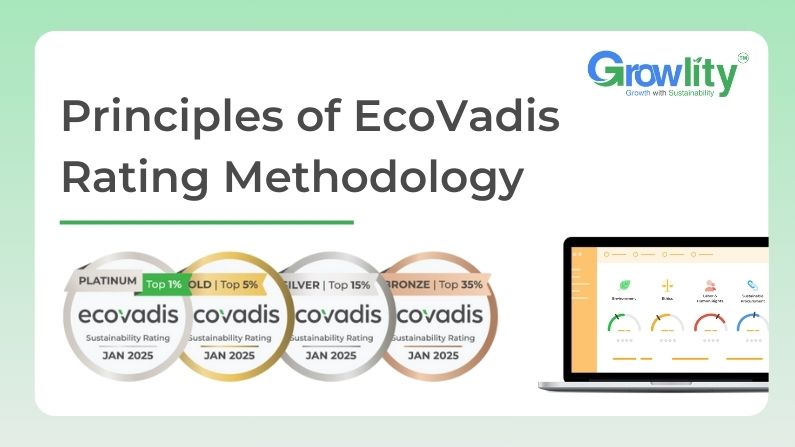EcoVadis is the world’s most reputed Sustainability Rating. Its prominence is on the rise as institutions and organizations across the globe are imbibing climate change and corporate sustainability as a part of their operations and culture. Its assessment along four pillars of Environment, Labor and Human Rights, Sustainable Procurement and Ethics looks at a company’s sustainability issues holistically. In this blog, we are explaining key principles EcoVadis analyst does leverage to provide suitable sustainability ratings.
To start with, lets looks at the basic approach of EcoVadis Assessment – Rate a company’s quality of sustainability management systems and processes along three dimensions:
- Policies cover Documentations
- Actions covers Initiatives and Key Performance Indicators (KPIs)
- Results cover Outcomes and Achievement
To assess any company, EcoVadis has defined the following criterion:
1. Evidence Bases
Company under assessment must provide proofs of its sustainability practices. This means that the company has to upload documents, certifications and reporting dashboards in order to secure an appropriate score.
2. Size, Scale, location and Industry Sector
When EcoVadis proposes sustainability issues, it keeps in mind Geography, Scale and Industry Sector for the company under assessment which is further termed as Site level, Entity level and Group level.
3. Transparency
Each assessment is done based on proofs and evidence provided by a company under assessment and hence EcoVadis ensures that outcome can be linked with the documents uploaded. This way it also provides credible authencity and traceability for the published score.
4. Push for Continuous Improvement
While publishing report card of the company, EcoVadis also recommends best practices for improvement of sustainability practices resulted into the medals and badges. Internally as well, EcoVadis also has robust quality control and feedback mechanism led by experts.
5. Diversification of sources
When an analyst assesses a company, it not only goes by what is being provided by the company but also checks several global trends, endorsements, regulations and evaluation of third-party sources. This ensures unbiased ratings.
6. Assessment by International Experts
The assessment and subsequent rating is provided by international sustainability experts who are aware about emerging concepts not only in environmental sustainability but also into ethical and transparent supply chain.
7. Technology driven
the assessment leverages technology for communication and information sharing including the areas of improvements. This is a must for data confidentiality and speed in assessment.

Recent Comments